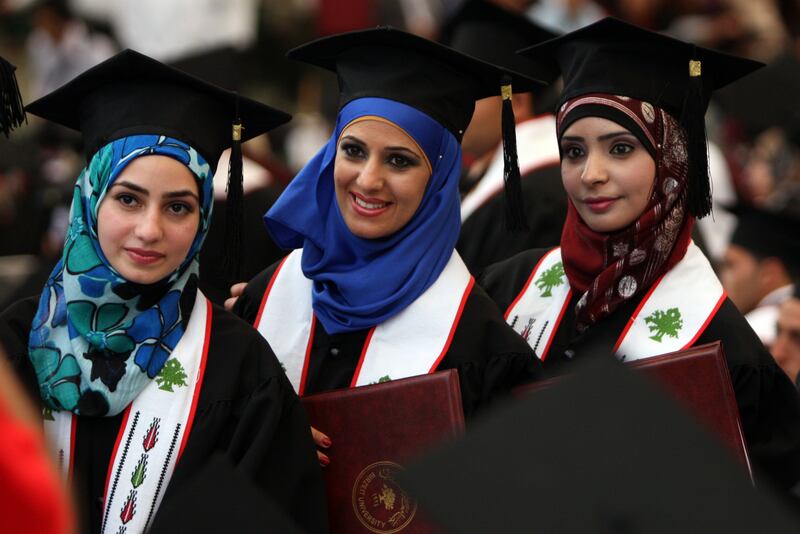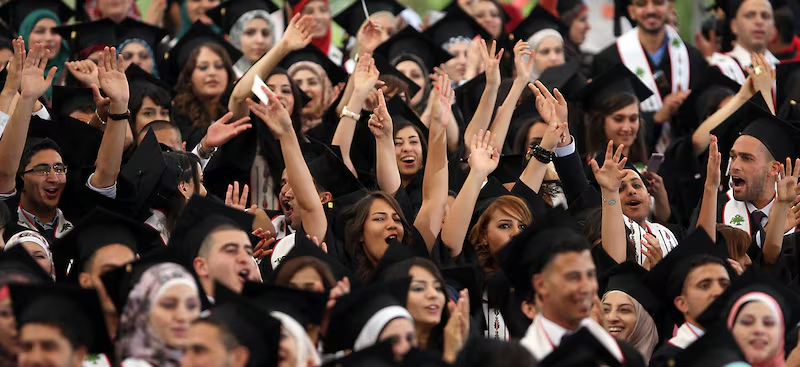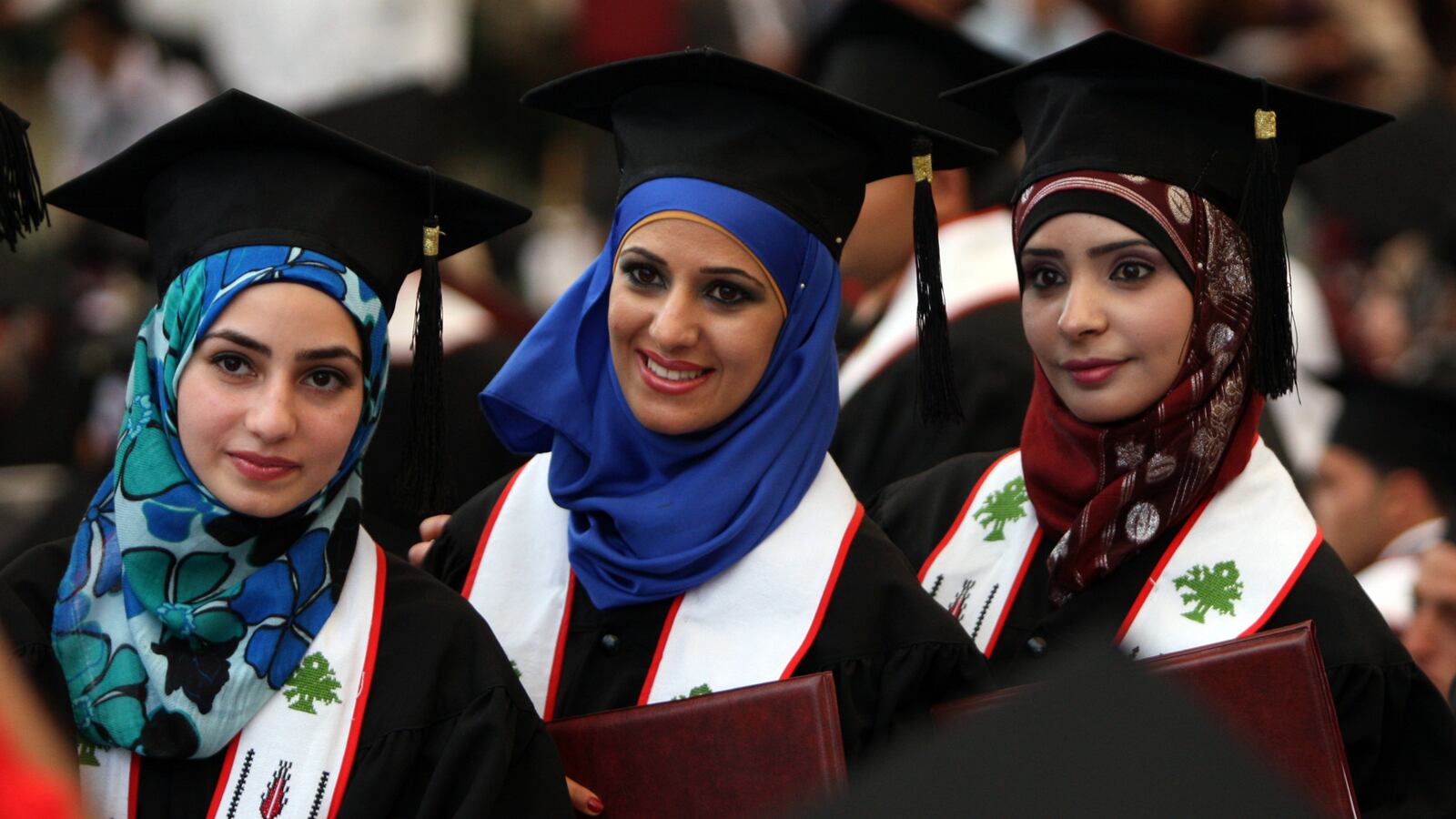It is graduation season and students all across the globe are donning their mortarboards and getting ready to march out of the safety of the college bubble and into the real world. Palestinian students in the Class of 2013 are no exception, but the future they are facing is not so bright.
For Palestinian students, the road to higher learning is full of roadblocks and barriers and getting in to college is no small feat. Dropout rates among Palestinians are off the charts. If they do manage to stick it out, university acceptance and choice of major is dictated by one evil standardized test known as the Tawjihe exam. There is no college application where you get to write an essay about who inspired you the most and talk about how you were captain of the cheer team, editor of the yearbook, and volunteered for Habitat for Humanity. The Tawjihe exam, all by itself, dictates these students' entire future. The test is administered at the end of high school students' senior year, over the course of a week. It tests them on everything they have been taught since kindergarten, ignoring the fact that many of these pupils have missed entire months of school during the second Intifada's endless curfews. If you test badly, there are no testing assistants and no special accommodations. You’re just screwed.

Like American standardized testing, the Tawjihe exam favors the haves over the have-nots. Refugees depend on UNWRA for schooling and as UNWRA continues to disappear their services, the education it provides continues to fail the growing student population. They cut the school day from eight hours to four in several camps and are certainly not attracting the cream of the crop of educators either. UNRWA teachers are paid such menial wages that many treat teaching like flipping burgers. Even the most well-intentioned, highly dedicated teachers are overwhelmed by the overcrowded classrooms and lack of resources. Privileged parents bring in tutors to prepare their children for the exam by teaching them what they missed during the curfews and what they may have forgotten from the third grade. The majority of Palestinian students simply do not have that luxury, making their chances of success far lower.
Tawjihe time causes great angst for the students and their families. Education is a very big deal to Palestinians and parents put enormous pressure on their children to excel. Teens end up hospitalized from the stress of staying up all night for months on end trying to study for Tawjihe in a house full of screaming younger siblings and with a bachelor party raging outside. Once the test is over, students must endure a month of waiting before the results are announced. Yes, the names of those who passed are publicly announced on radio, in newspapers, on loudspeakers, and of course, on the internet. If you do not hear your name, it means you have failed. You have publicly shamed your parents. Your life is done and you, my friend, are not going to college. It’s time to go build settlements or get married because your shot at higher learning is pretty much gone.
The ones lucky enough to pass are not home free yet. The score you receive on the Tawjihe exam dictates what universities you are eligible to attend. Often, if the school is not in walking distance, the student can neither afford the transportation costs or the boarding fees, even with a scholarship. Then there are those who are given a scholarship but denied permission by Israel to attend the university awarding it to them because they live in Gaza and are not allowed to enter the West Bank, not to mention study there, without a permit.
Even if you have all your ducks in a row, you’ve passed with flying colors and your dream school is a stone’s throw away, there is still one last major obstacle: tuition. Scholarships are extremely rare and you definitely need some skills in folk dancing to get one. Families who can barely make ends meet often have multiple children attending college simultaneously. Tuitions are skyrocketing in the West Bank, too. Bethlehem University thought it would be fun to raise tuition since the Palestinian economy has been booming, and by booming I mean a complete mess. Student loans are also an option. Unfortunately, these same loans often force students to leave school to find work to pay off said loans that have destroyed their parents’ lives. There is no deferment, there is just pay 50 percent of your income, now.
Once students pay tuition, they can officially enroll in classes. In many cases, the classes they want are full and unlike in the States, where you can just take it next semester, these students, instead, are forced to change majors. A recent graduate from Hadassah Academic College was forced to switch majors from speech therapy to optometry simply because when she went to register, all of the speech therapy classes were full. Luckily, she grew to love eyeballs, but many students end up stuck in majors they loathe with no way out except dropping out.
Students who survive the gauntlet and make it into college face a whole new set of challenges. Different levels of religiosity lead to your standard Romeo and Juliet dramas, and love triangles are as common on Palestinian university campuses as they are on Turkish soap operas. Strangely, there is a culture clash that happens when Palestinians from the various villages, cities, and camps come together to pursue higher learning. Israel has been so successful at cutting Palestinians off from each other that although most of these kids live only a handful of miles apart, it’s like they come from different states. A student from Yattah and a student from Taybeh attending university together have about as much in common as a chick from New Jersey has with a girl from Kentucky.
There is also tension created by politics seeping into campus life. Currently, one of the biggest things on Palestinian college campuses is student government. The youth members of Fatah, Hamas, and DFLP hold annual elections on campus, something that the actual parties have failed to do, in reality, since 2006. Once these future leaders graduate, however, they are not embraced by the political parties they represented on campus. They are not encouraged to get involved. The old dinosaurs want nothing to do with these new minds, even though they sunk an obscene amount of money into the college elections to make sure those representing their party won. The other downside of getting involved in politics on campus is that it tends to lead to being arrested by the Israelis or the Palestinian Authority, who have recently joined the fun.
A far bigger issue than everyone getting along is the fact that students from private schools, public schools and UNWRA schools are all placed in the same level freshman classes in their major, regardless of what level they are actually at. The less privileged find themselves playing catch-up from day one and professors find themselves teaching basic writing skills to college freshmen. If you can keep up with your studies, getting to class is still a huge nightmare, not because the students are lazy or hungover, but because Palestinian students have to deal with checkpoints. Depending on the Israeli soldiers’ mood, breaking news, or the weather, crossing a checkpoint can take anywhere from 7 minutes to 14 hours and you can only use the "The soldier ate my homework" excuse so many times before the professor has no choice but to fail you.

Palestinian students who attend Israeli universities have their own set of issues. Spared of the Tawjihe exam, they are instead subjected to the Bagrut exams, which is the Israeli equivalent. These standardized tests show no love to the Palestinian students whose test scores lag far behind their Israeli counterparts. Incredibly, most of the students who do manage to get accepted to college are not fluent in Hebrew, the preferred language of Israeli universities. They end up taking crash courses in it and basically simultaneously translating everything they learn. This puts them at a huge disadvantage as they struggle to keep up. Racism against the small but vocal Palestinian minority on Israeli campuses is also ever-present and on the rise. Think tensions ran high on American campuses during the U.S. presidential elections? Imagine being a Palestinian student, during the Gaza massacres, attending a college in Rishon Lezion with freshly discharged Israeli soldiers who are cheering them on.
The Palestinians who do manage to receive a diploma, against all odds, are faced with yet another challenge. If Americans thinks their job market is bad, they should take a gander at the astonishingly high unemployment rates in Gaza, East Jerusalem, and the West Bank. Palestinian students graduating with more hope than Obama's supporters had in 2008 are faced with little to no opportunities. Recent graduates in the West Bank and Jerusalem are losing out on jobs to the internationals the NGOs insist on importing. A college grad with a degree in journalism is lucky to get a job pouring coffee at the BBC offices. Students who chose majors they felt would be easier to find a job in, like social work, are finding that they are a dime a dozen—and without a corrupt connection or nepotism, there are no jobs to be had. The few jobs that are available pay abysmally and sometimes don't pay at all. Meanwhile, Palestinians graduating from Israeli colleges face not only an extremely competitive job market, but also massive discrimination. Employers like to require army experience as a pre-requisite in order to weed out the Palestinian applicants. Other employers don’t even try to hide their hatred and make it clear that Arabs need not apply.
Even with all these forces working against them, graduating students from Jaffa to Jenin still manage to dream big. Whether opening a micro recycling business, pursuing a master’s degree, or searching for an elusive job, their goals are clear and they somehow still believe that with hard work and determination anything is possible. I cannot decide if this is delusional or inspirational, but either way I am rooting for them to succeed.
To all the Palestinians in the Class of 2013 who made it to graduation without failing out, being jailed, expelled, killed, or married, I say congratulations and good luck. You will need it. Oh and if any of the recent graduates is looking for a job as Prime Minister, you are in luck! I hear a spot just opened up.






